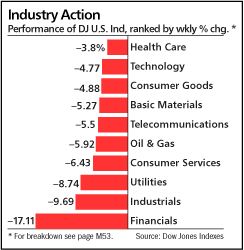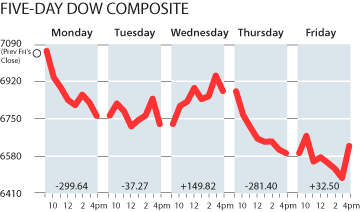HP has become a more profitable and financially stable company under CEO Mark Hurd, who sees modest earnings growth through the next year. Better yet, the current slowdown may provide opportunities for HP to gain market share.
HEWLETT-PACKARD CHIEF MARK HURD doesn't offer any greater insights about the length or depth of this recession than the next guy. "This is not a strong market," he says. "We don't have any way of predicting whether this is a rebound.... It's going to take a period of time to build the fundamentals backup in the economy."
Buying EDS opens up opportunities and makes HP a tougher foe of IBM.
Even if his observations don't stray far from the conventional wisdom, Hurd distinguishes himself in a more important way: the ability to manage a huge technology company through hard times.
While other tech titans like Intel have been reforecasting downward, spreading more doom and gloom, Hurd projects that HP (ticker: HPQ) will have modest earnings growth through next year. The Street's consensus estimate puts Hewlett-Packard's 2009 profit at $9.46 billion, or $3.84 per share, for fiscal 2009, ending Oct. 31. That would be up from $8.3 billion or $3.62 a share, in the 2008 fiscal year.
The cost-conscious Hurd recently told Barron's that he is focused even more on profitability in this tough environment than he has been at other points in the business cycle. "I'm a lot more comfortable on the bottom line than I am on the top line, and I think we'll do well, relative to whatever market shows up, and that's probably the best I can do," he said in a recent interview at HP's Palo Alto, Calif., headquarters.
About a week before HP was slated to announce quarterly earnings last month, Hurd suspected that he had better news than his competitors, especially Dell (DELL), which was scheduled to announce its earnings four days before HP. With Hewlett shares at that time down 35% this year, to about 29, Hurd opted to preannounce a positive surprise to earnings, pushing his stock up about four points just afterward, even though future revenue (not including new sales from a major acquisition) looked "flattish." As it turned out, Dell's earnings met previously lowered estimates, though its revenue was disappointing to investors and its stock fell about 10%.
Hurd, who spent 25 years at National Cash Register, including a stint as CEO, sits atop one of the biggest information-technology companies in the world. It operates in three businesses: imaging and printing, which has long been a cash cow, accounting for about 25% of annual revenue; personal systems, which includes the personal-computer unit along with other consumer electronics and gadgets that generate roughly 36% of revenue; and technology solutions, which consists mostly of enterprise servers, storage, and business software and services, such as outsourcing, that also produce about 38% of revenue.
LESS THAN A DECADE AGO, HP was almost solely dependent on printer-ink supplies. Since Hurd's arrival in 2005, each of the business units has grown more profitable, giving the company financial balance and stability. Over the past four fiscal years, revenue has grown to $118.4 billion from $80 billion, while earnings per share have more than doubled.
HP Diversified Opportunities: Hewlett-Packard has a multitude of services and products aimed at both the consumer and corporate markets. About 60% of its revenue comes from abroad, another plus in tough times.
This emphasis on profits and diversity has helped HP earn a reputation as a top defensive tech play. In Hurd's nearly four-year reign, HP has met or exceeded every quarterly consensus target for earnings per share.
Recurring revenue of $40 billion a year helps HP qualify as a defensive play. This comes from items like ink supplies, outsourcing and corporate leasing, which account for about a third of total revenue. More important, those recurring sales will help to generate about half of the company's $9.46 billion-plus in estimated fiscal '09 earnings.
HP has the size and diversification -- in geography (about 60% of sales come from abroad), product lines and exposure to both consumer and enterprise markets -- that allow it to perform well during slow-to-no-growth economies, Barclays' Reitzes says. "That is part of the reason Mark has that confidence," Reitzes says.
On Nov. 18, HP surprised Wall Street with a preliminary announcement that its fourth-quarter earnings would beat analyst expectations. The company reported non-GAAP fiscal earnings of $1.03 a share, surpassing the Street's $1.00 estimate. Net revenue for the fiscal year was $118.4 billion, up 13% from the previous year.
"Those are real solid numbers," says money manager Chuck Jones of Atlantic Trust in San Francisco. Atlantic Trust has $15 billion under management, including a stake in HP.
Despite their reversal of fortune, on a forward earnings basis HP shares trade more cheaply than Dell's. HP trades for 8.18 times fiscal 2010 estimated earnings, versus Dell's 8.32 multiple for its Feb. 1, 2010, earnings. HP also seems a bargain compared to IBM (IBM), which trades at nine times expected 2009 earnings.
The multiple is particularly attractive, says Jones, when coupled with HP's strong cash generation, even during miserable economic times, driven by the reliable revenue streams.
HEWLETT-PACKARD HAS "limited downside and significant upside," Jones says. He thinks the shares could rally to the low-50s once signs of normalcy return to the stock market. As much as Hurd's acquisition of the Plano, Texas-based outsourcing outfit EDS helps fulfill his quest to build a "one-stop shop" for corporate digital-data needs like IBM's, there still is an important distinction between HP and Big Blue: the consumer market.
HP has the third-highest consumer revenue among computer-electronics outfits, following Apple (APPL) and printer-maker Lexmark (LXK), according to Bernstein Research hardware analyst Toni Sacconaghi. About 25% of HP's sales come from consumer products, compared with less than 1% at IBM, which exited printers and personal computers years ago to concentrate on corporate services.
Consequently, half-empty shopping malls have weighed heavily on HP shares, Sacconaghi says. But, considering that inkjet supplies account for about 98% of HP's consumer-driven profits, those fears are exaggerated. Ink sales should be "relatively immune to a slowdown," says Sacconaghi, who rates HP a Buy and expects the shares to reach 40.
Another interesting twist is that soft printer sales could actually mean higher overall margins, because printers lose money at retail. Sacconaghi foresees a drop in printer sales that would boost operating profits by $65 million, sufficient to compensate for a potential drop of nearly 2% in ink sales.
Long term, a decline in printers would hurt Hewlett-Packard. But Hurd says it's not a bad thing in the short term, especially as HP research shows people are keeping their printers longer. "We don't care if it's a new printer or an old printer doing the printing," he says.
Personal computers also are important contributors to HP's consumer-product line, kicking in about 10% of operating profits. After showing resilience in 2008, PC sales growth is expected to slow in 2009. The research firm IDC expects PC unit shipments industry wide to grow only 3.8% next year, compared with its earlier forecast of 13.7% growth. PC revenue is expected to fall about 5.3% in '09, compared with previous predictions of 4.5% growth, nearly a 10 percentage-point swing.
The biggest boost to profits and margins should come from EDS. This strategic addition is expected to allow HP to compete more aggressively with IBM for big corporate deals, and its integration couldn't be more timely. With operating margins in excess of 60% and long-term contracts stretching over three to five years, the EDS outsourcing business supplements recurring revenue while taking some of the pressure off inkjet-supply sales.
What's more, outsourcing is an enterprise-related, not a consumer business. Bernstein's Sacconaghi was concerned that some corporate clients would try to use change-in-control clauses in their contracts to bail on their outsourcing commitments, but Hurd says that hasn't been the case, except for a handful of customers who had disputes with EDS. "I can't think of any material customer exiting," Hurd says.
As CEO, Hurd consistently has met or beaten profit expectations.
Hurd has recruited the former CFO from his days running National Cash Register to help oversee the cost-cutting project. Pete Bocian, who had moved to Starbucks as CFO, was named chief administrative officer of HP in November, and will be based in Plano, near HP's EDS operations.
HP's other challenges include a weaker euro, which has a negative effect on revenue. Hurd urges investors to focus on profits. Margins, he says, would remain the same regardless of currency fluctuations. It is also possible the dollar will weaken again against the euro, in light of the Federal Reserve's dramatic interest-rate cuts.
Debt is also an issue. HP used commercial paper to finance its EDS acquisition, with the intention of extending its maturity later on. Given the capital markets' problems, that may now be tough to do. But Hurd counters that the company doesn't need to issue as much in bonds as initially thought, and the commercial-paper market remains open to issuers like HP, which recently completed a $2 billion bond offering.
Yet another potential problem is HP's large defined-benefit pension plan, which has been hard hit by the bear market in stocks. The company may have to kick in more money to maintain adequate funding. Bernstein's Sacconaghi says HP has built that risk into its planning, and any payments should be a "manageable" amount.
Given its strong financial position, the current slowdown could provide opportunities for HP to gain market share. "Now is the time to differentiate yourself with your customers," Hurd says. "It's not the easiest thing to do."
But it's something Hewlett-Packard -- and Hurd -- can do well.
Subscribe to:
Post Comments (Atom)


No comments:
Post a Comment